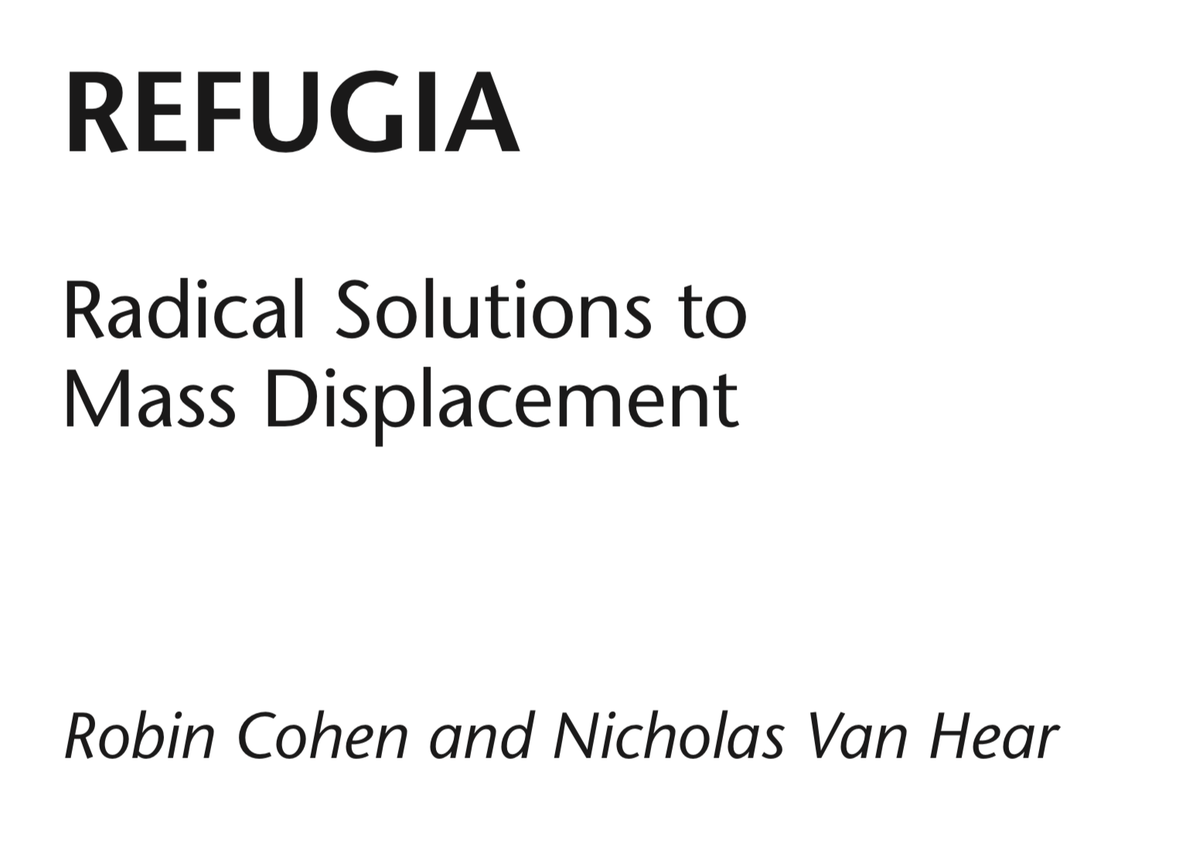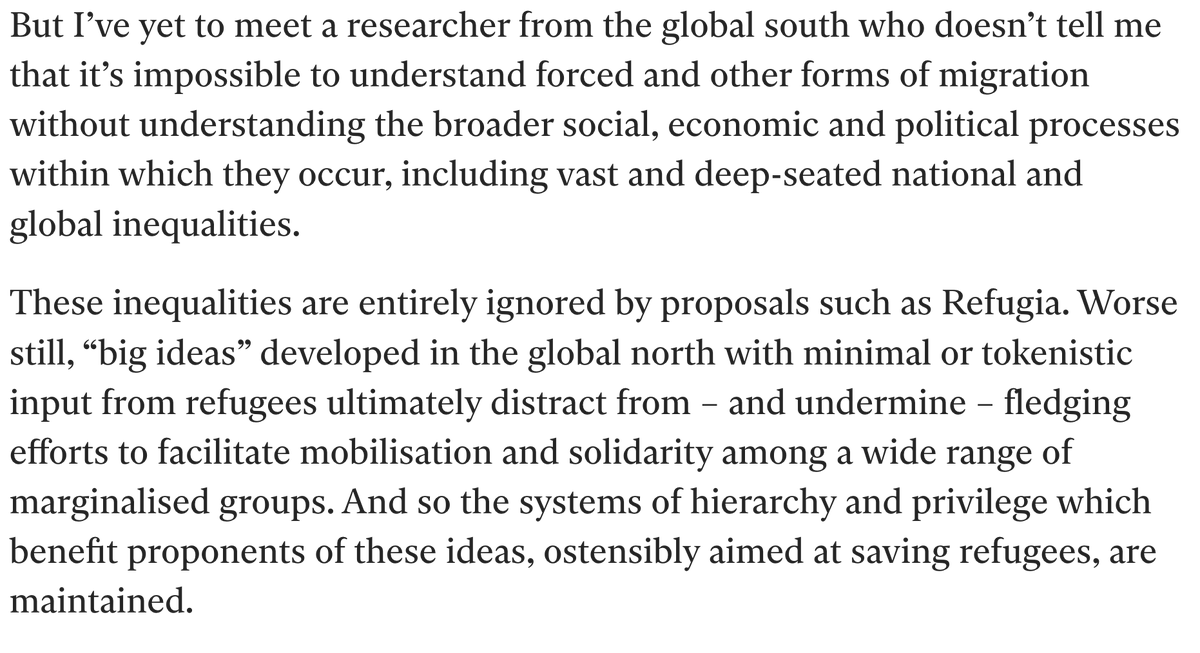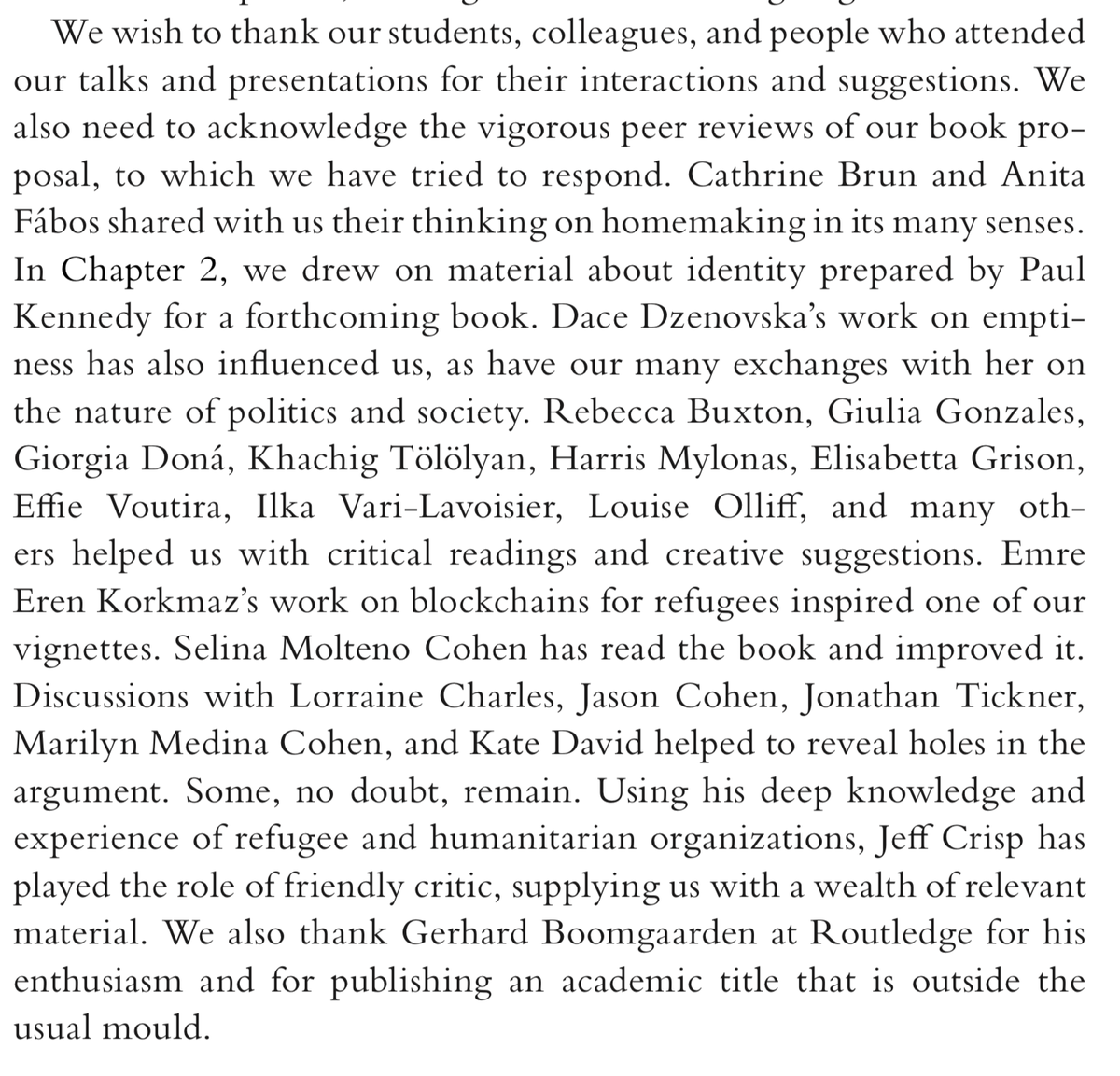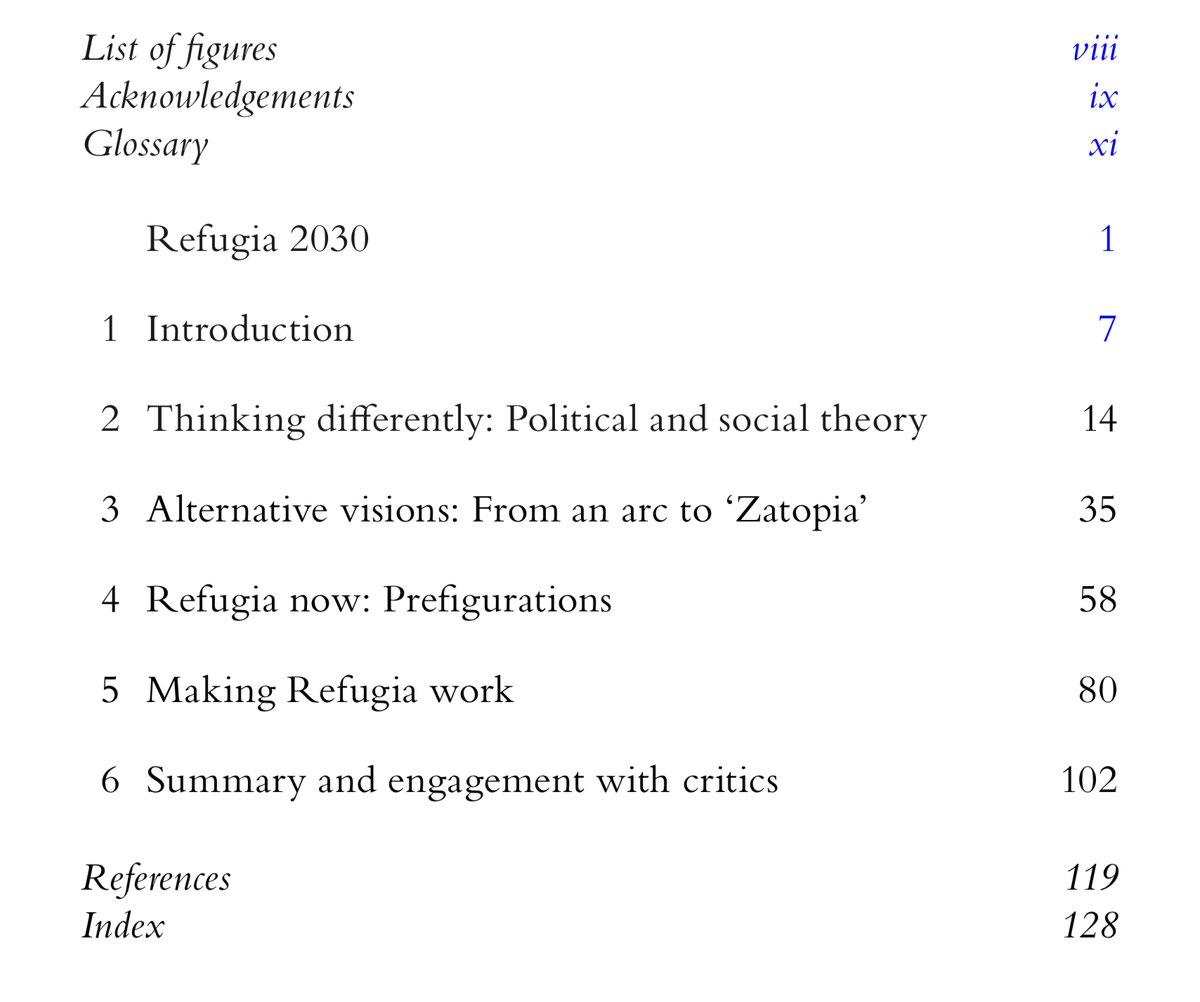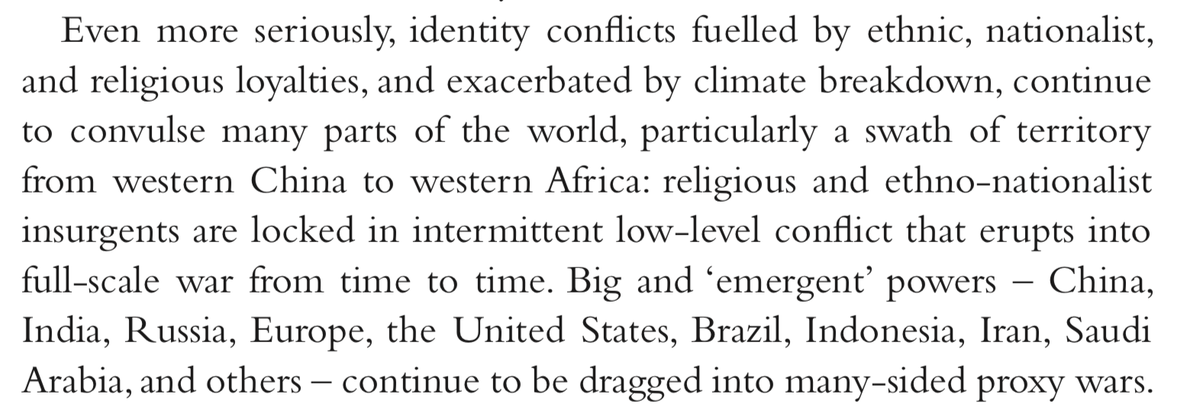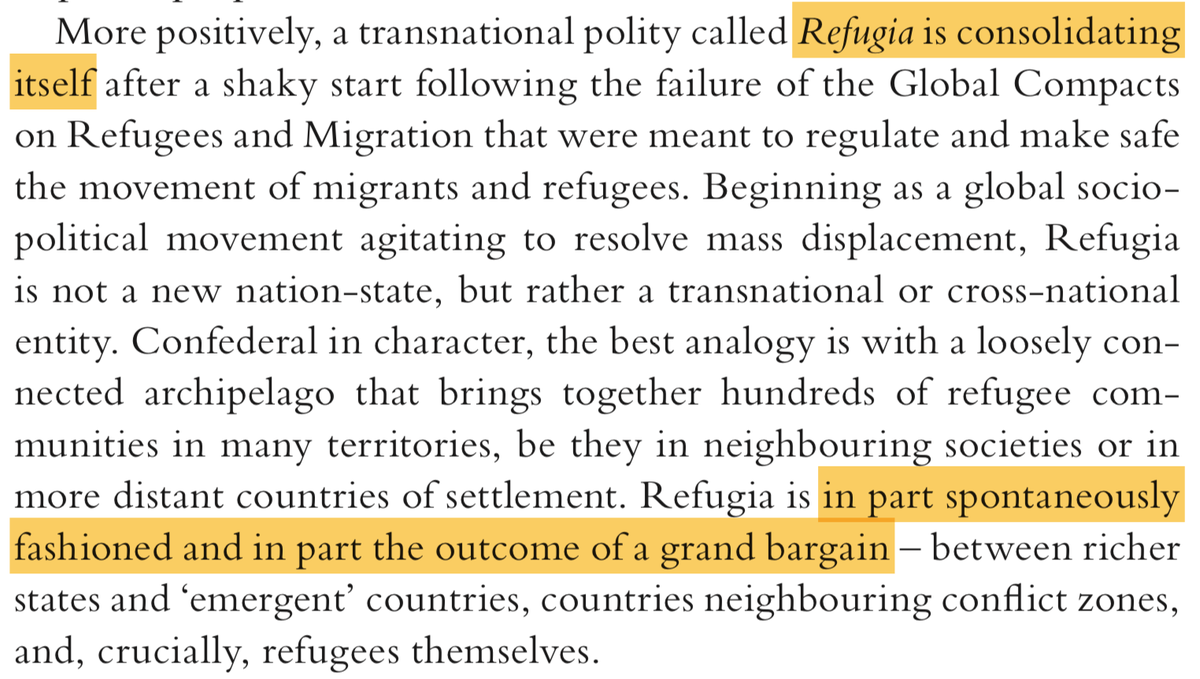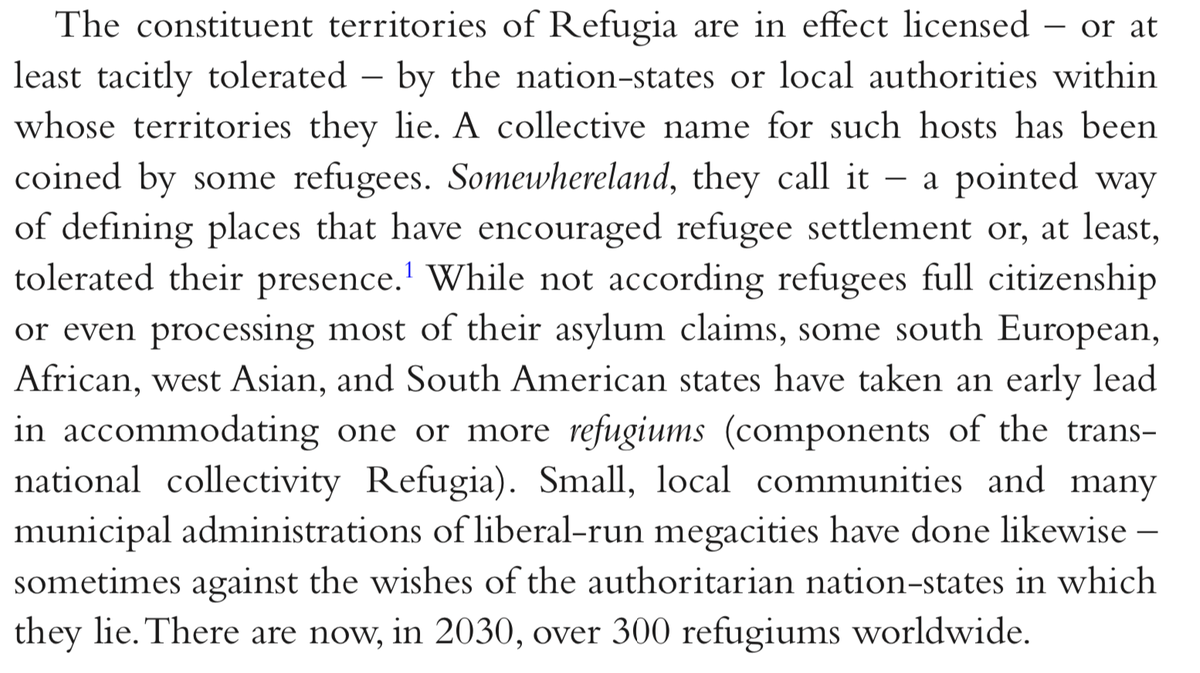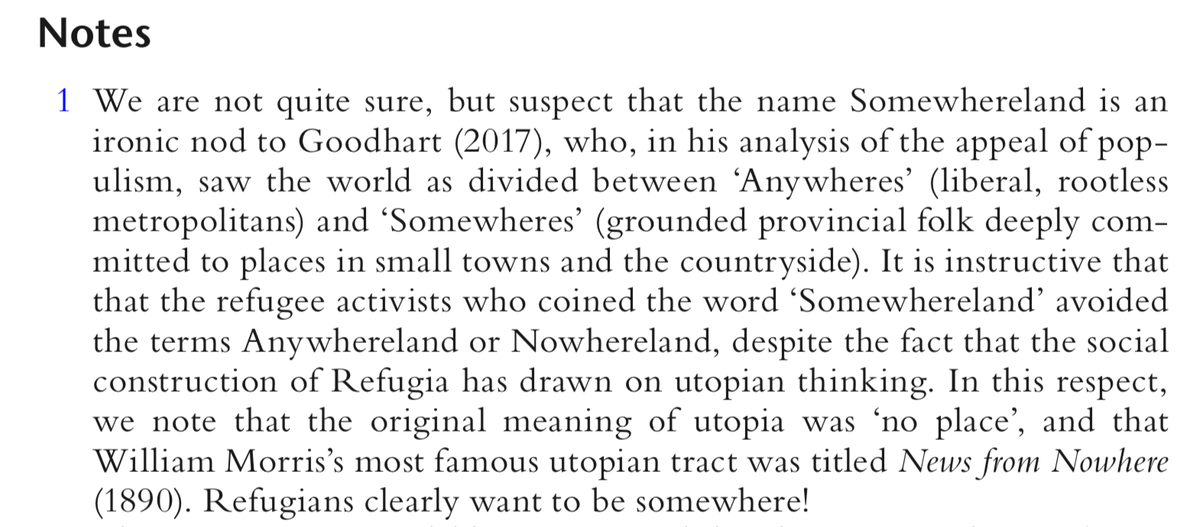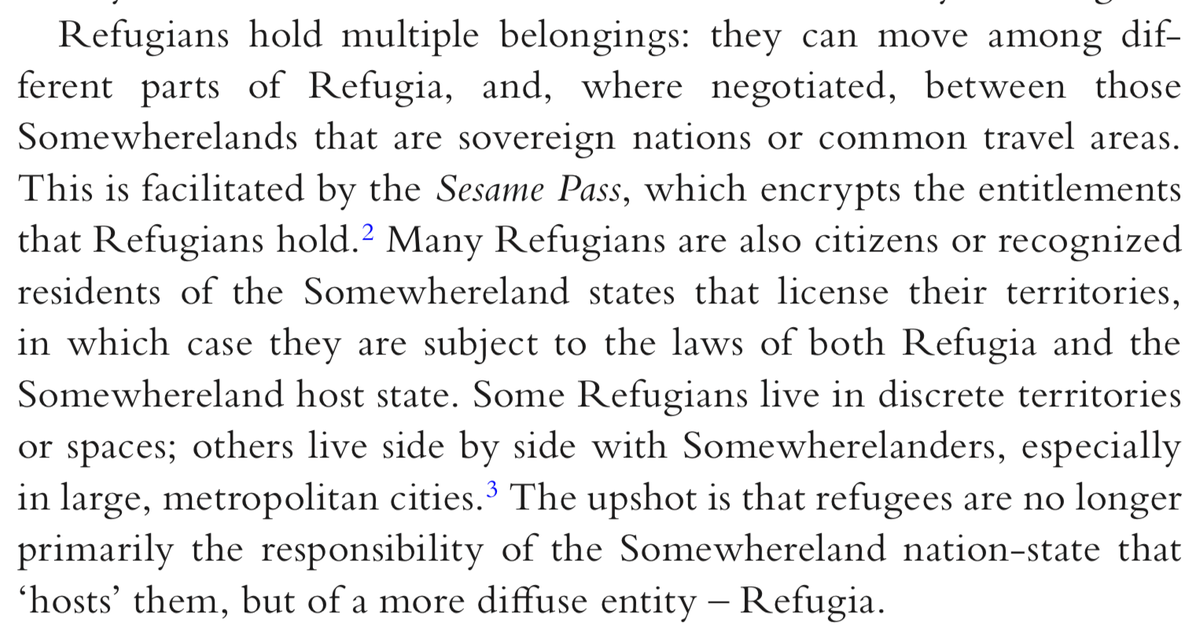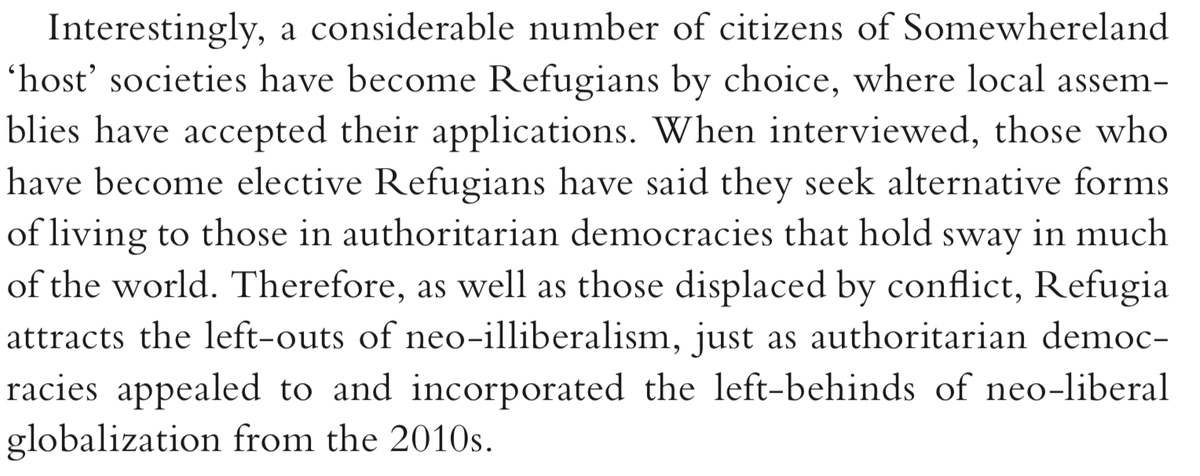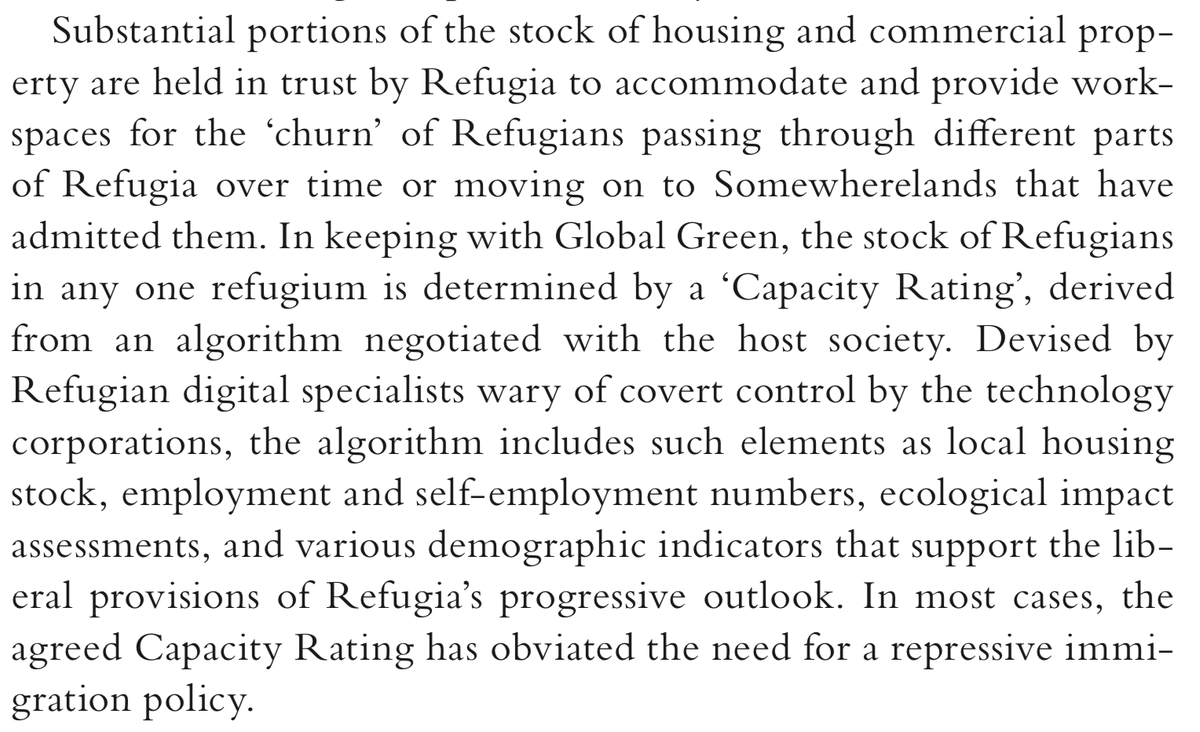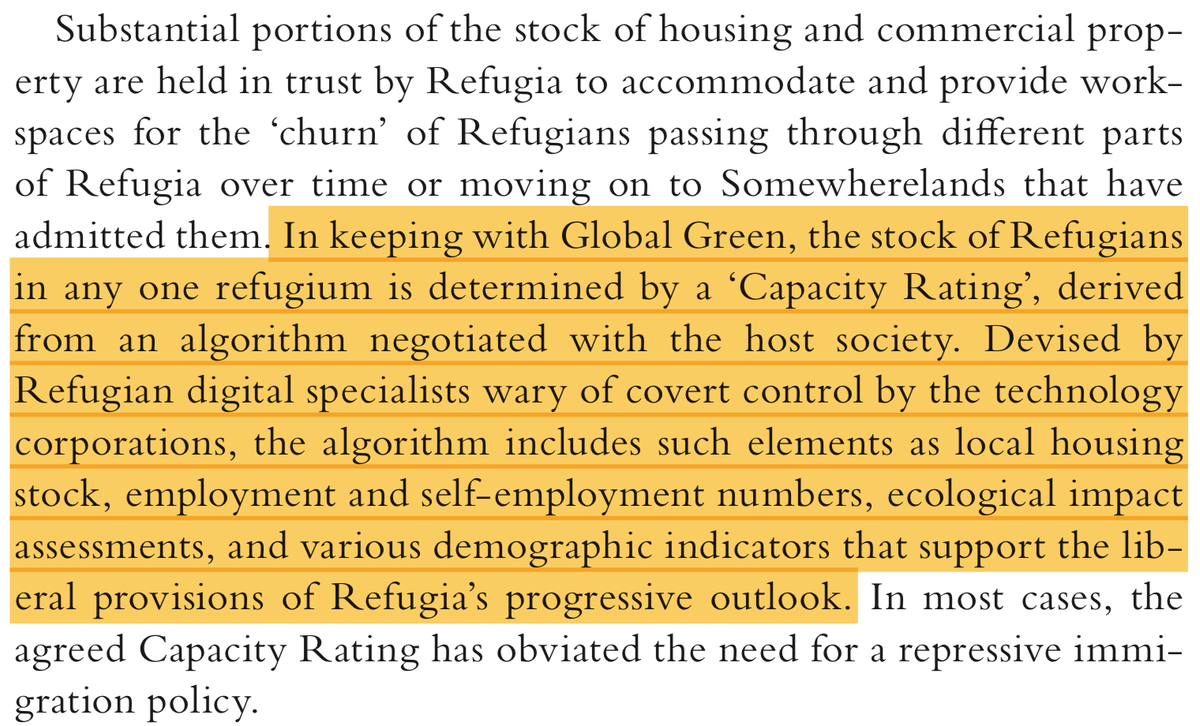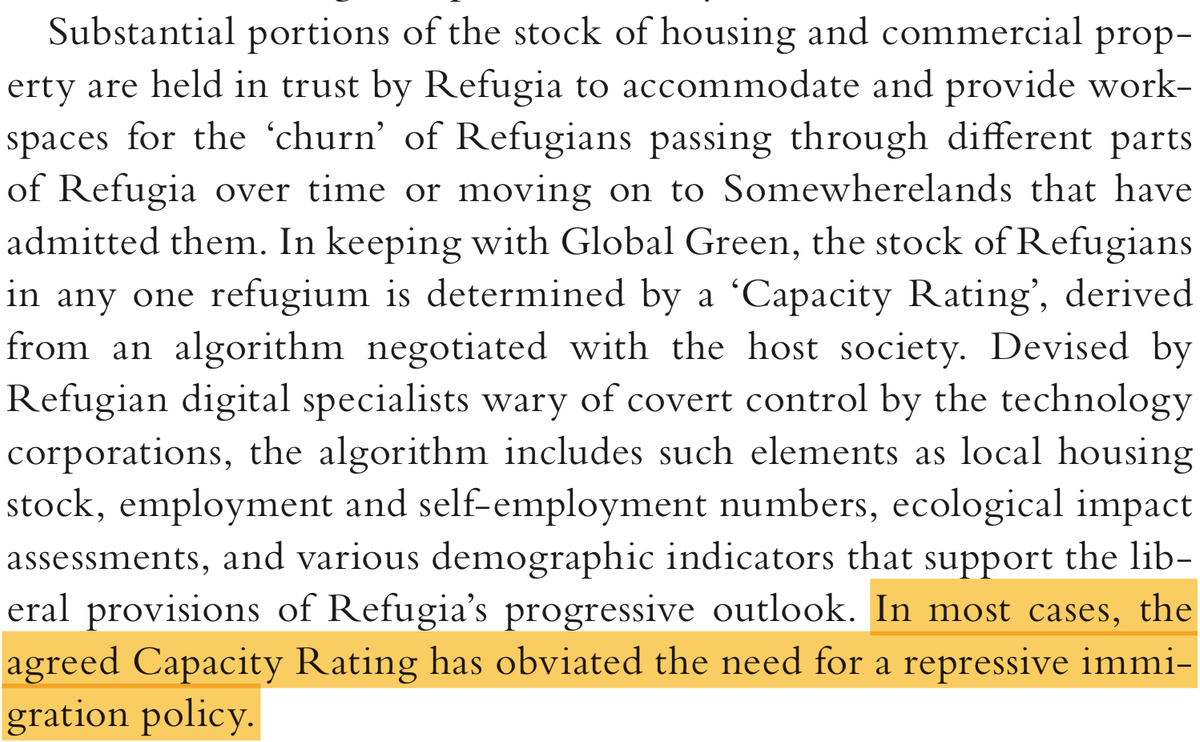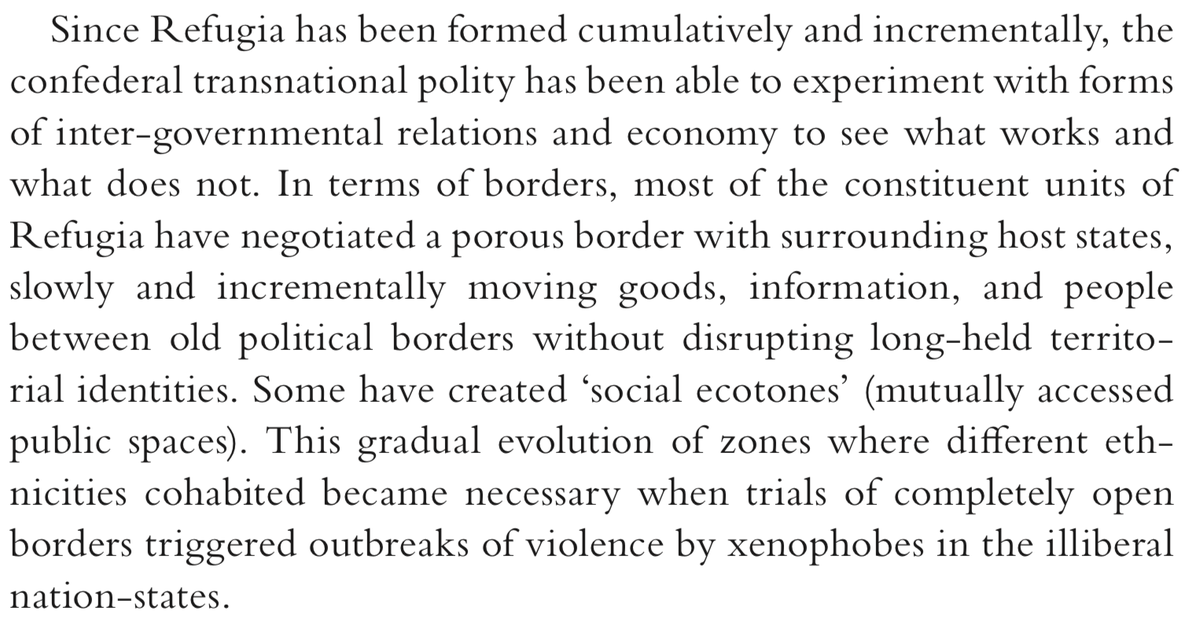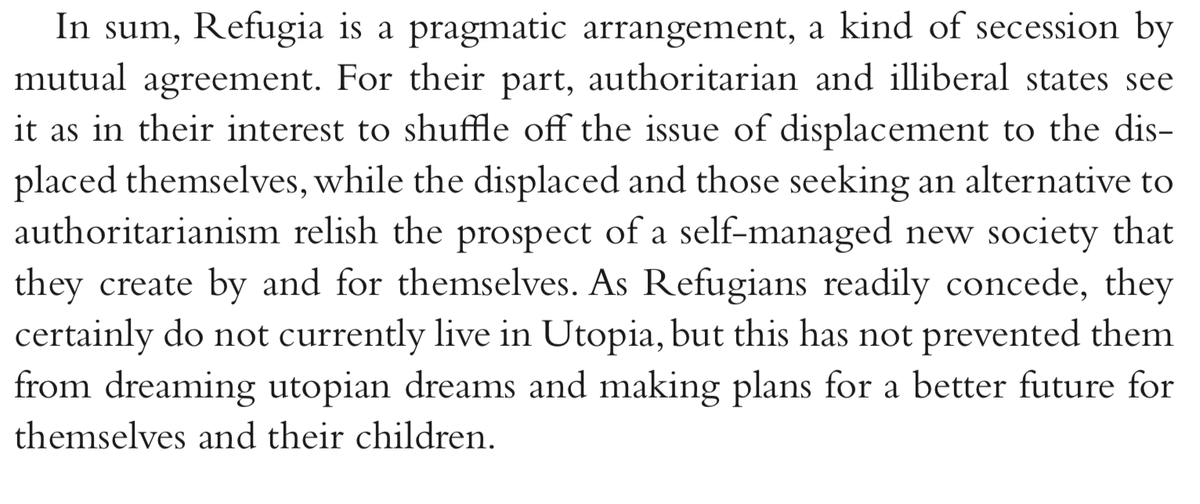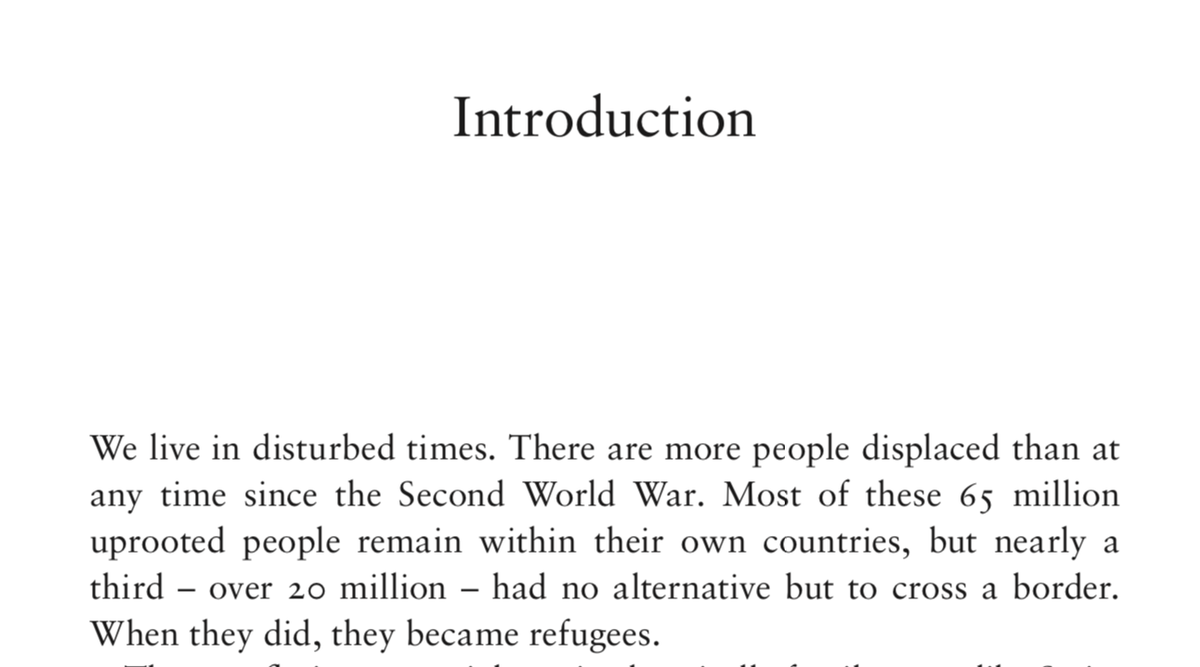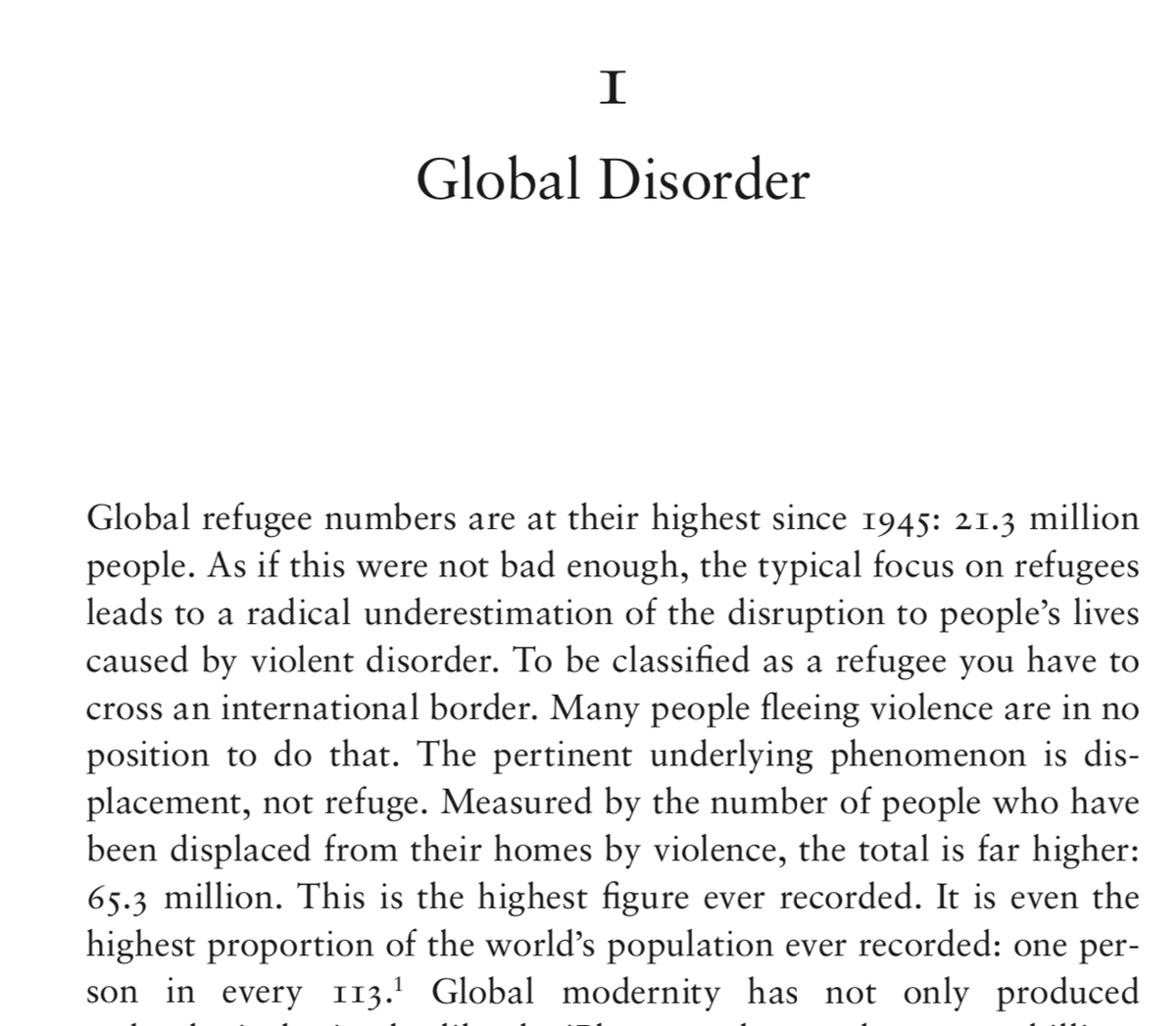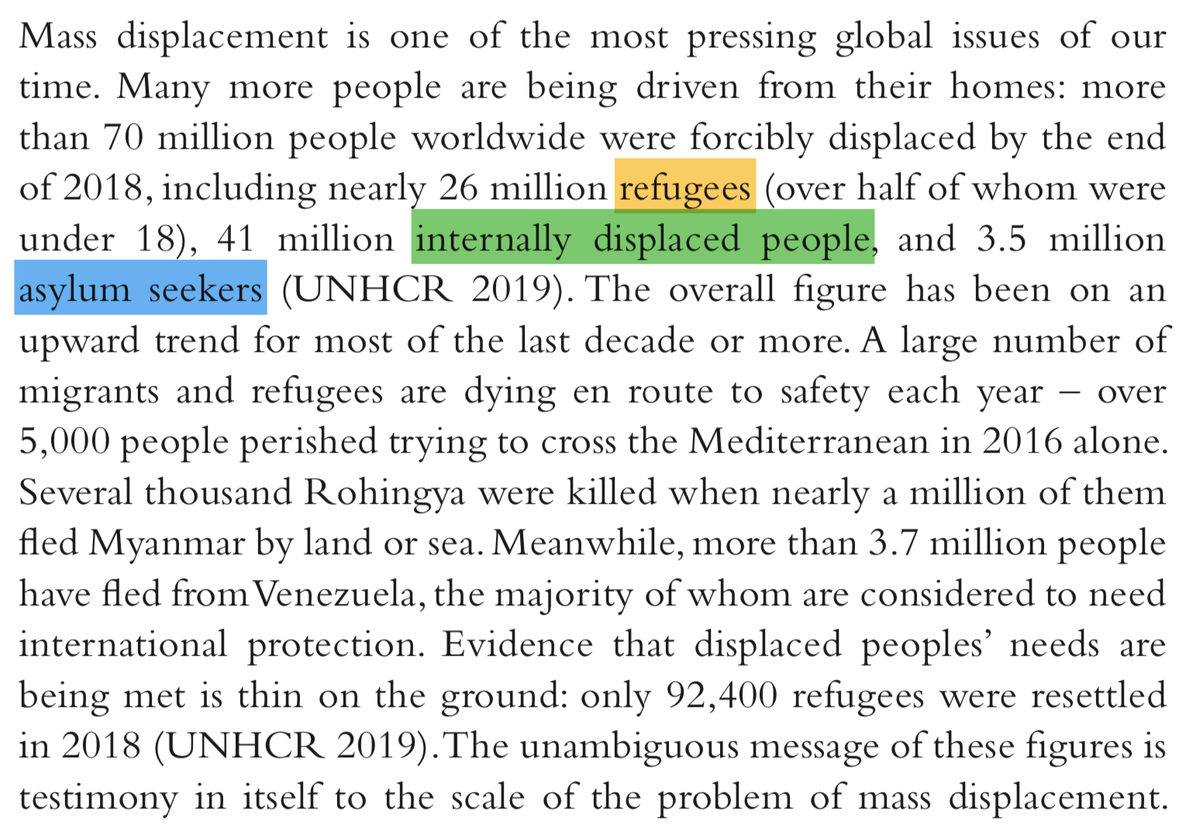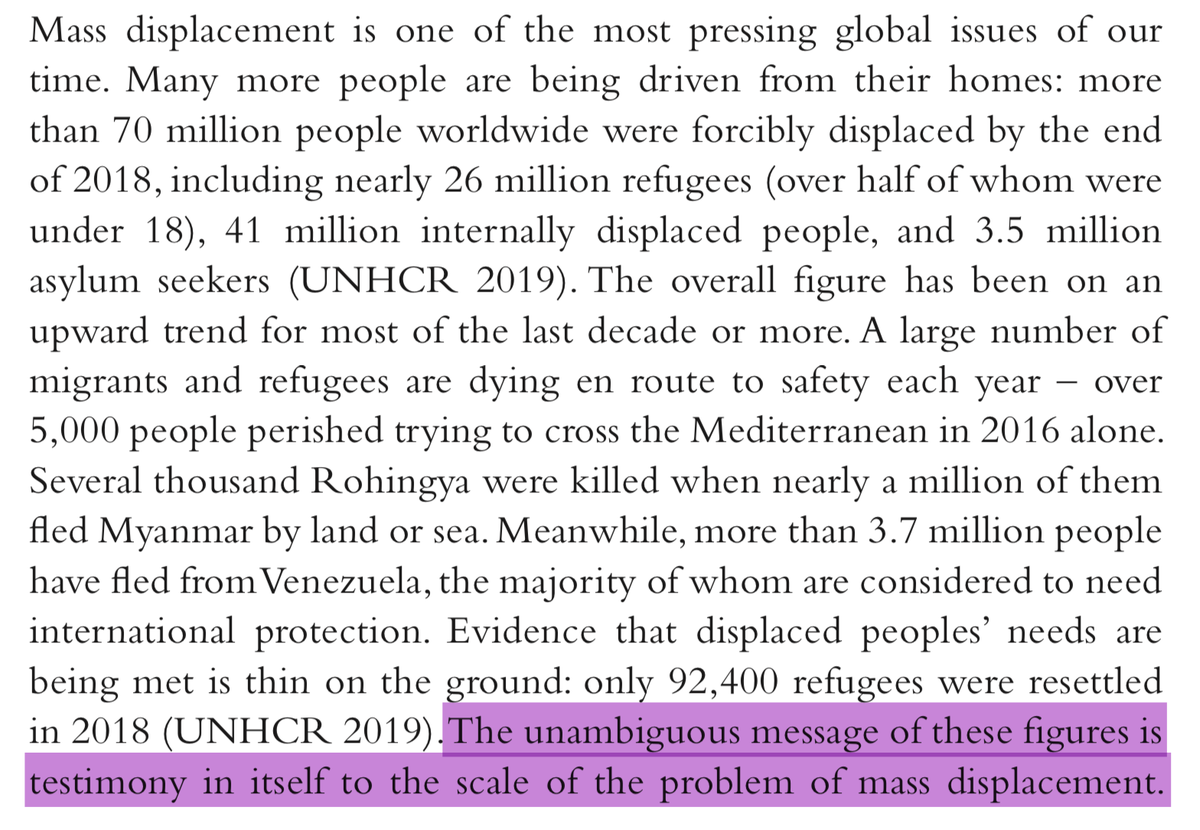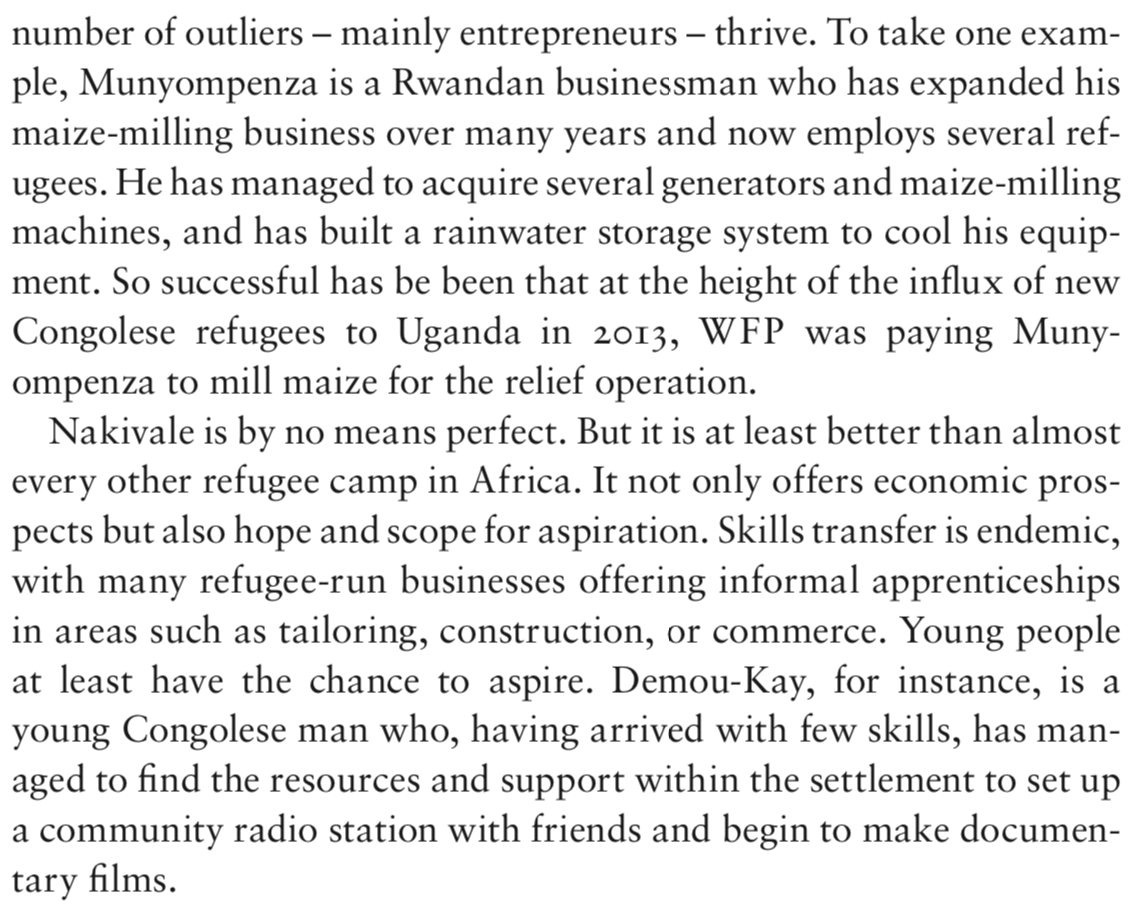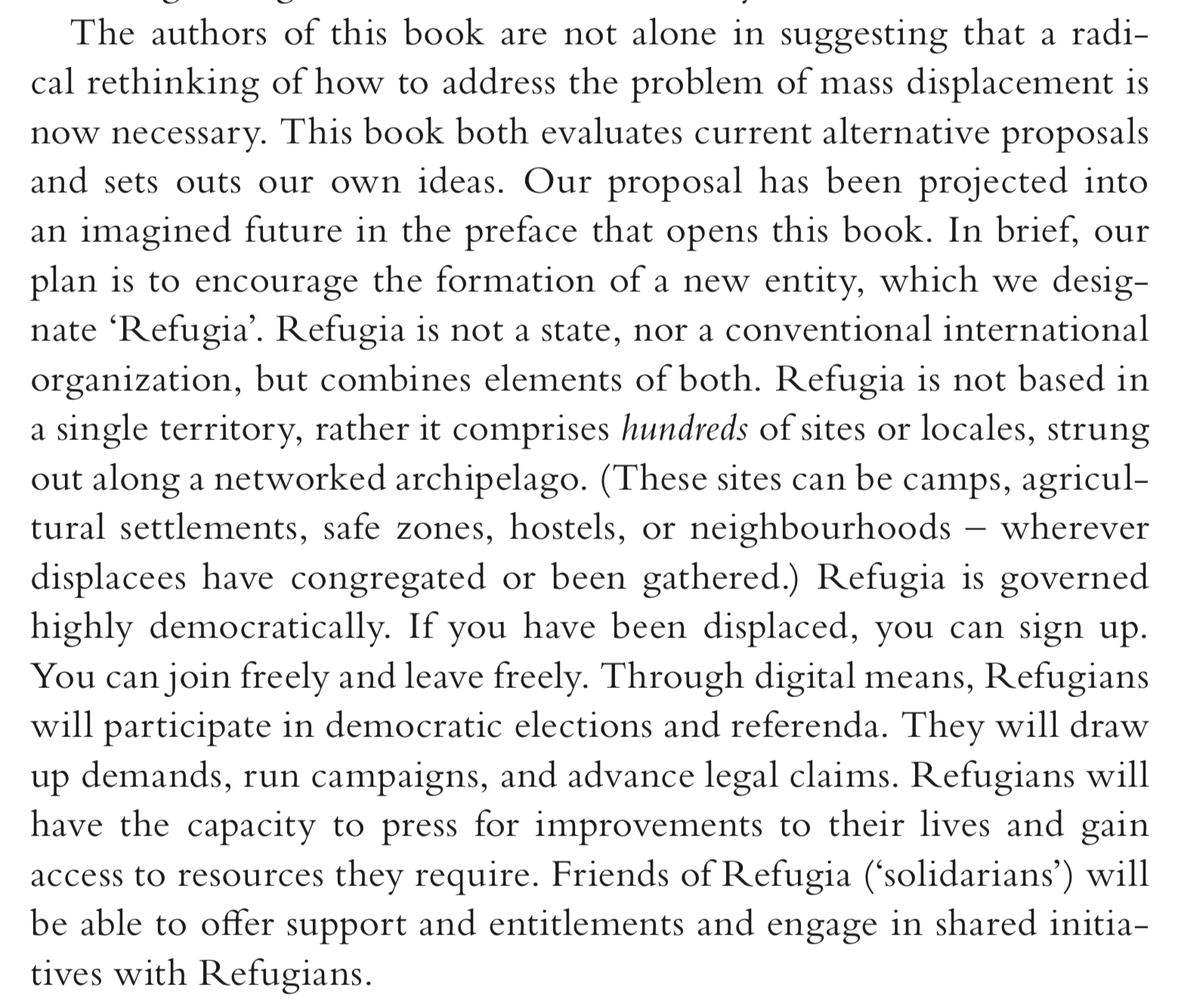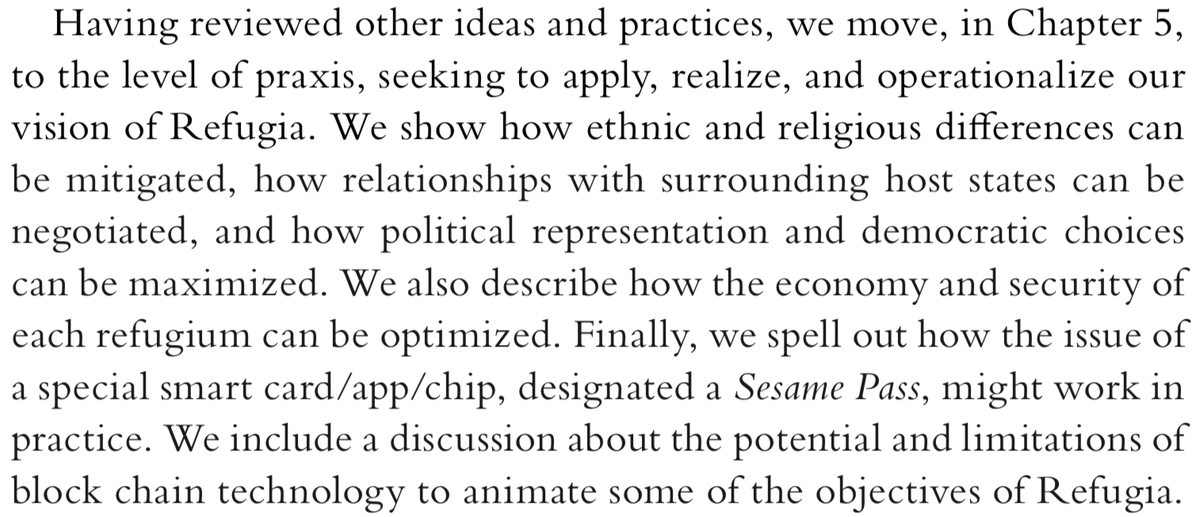I& #39;d better get a couple of points out of the way at the outset.
First, I& #39;d like to be clear that whatever my reservations about this book, it is written in good faith (unlike & #39;Refuge& #39; by Betts & Collier, which was written in rank bad faith).
First, I& #39;d like to be clear that whatever my reservations about this book, it is written in good faith (unlike & #39;Refuge& #39; by Betts & Collier, which was written in rank bad faith).
And second, if you& #39;re interested in this book but don& #39;t want to read a whole long thread about it then by all means mute this and read @heavencrawley& #39;s short article instead. https://www.independent.co.uk/voices/refugee-immigration-europe-migrants-refugia-self-governance-a8467891.html">https://www.independent.co.uk/voices/re...
Still, I think it& #39;s worth digging into the argument, to think about some of the specifics.
#Refugia
#Refugia
Beginning not at the beginning (or beginnings: there are two), but before that, with the acknowledgements.
I know some of the people mentioned here. (I like them!) But I can& #39;t help noticing that the authors of this proposal for a radical solution to mass displacement haven& #39;t spent much time discussing it with... people who are displaced.
Heaven Crawley again:
“big ideas” developed in the global north with minimal or tokenistic input from refugees...
“big ideas” developed in the global north with minimal or tokenistic input from refugees...
Okay, a quick word about the structure of the book. It starts with a vision of & #39;Refugia 2030& #39;. Six chapters follow, and after each of those (except the last) there& #39;s a & #39;Vignette& #39;: an imagined scene of social science fiction.
What is happening in Refugia 2030?
Well, there don& #39;t seem to be many Arabic-speaking proof-readers around, for one thing. Wonder if the Mandarin is as bad.
(Sorry, annoying.)
Well, there don& #39;t seem to be many Arabic-speaking proof-readers around, for one thing. Wonder if the Mandarin is as bad.
(Sorry, annoying.)
The authors& #39; vision of the near future starts with a view from the global north.
And although, as we& #39;ll see, the authors of this book take issue with David Goodhart, they& #39;ve essentially accepted his spurious analysis as the basis of their vision of the near future. Strange.
And although, as we& #39;ll see, the authors of this book take issue with David Goodhart, they& #39;ve essentially accepted his spurious analysis as the basis of their vision of the near future. Strange.
When your understanding of the causes of mass displacement is so one-dimensional, and implicitly racist, your proposals to & #39;solve& #39; it probably can& #39;t be trusted.
Also: I wonder where these imagined & #39;commentators& #39; live. Juba? Idlib? Or... Oxford?
Also: I wonder where these imagined & #39;commentators& #39; live. Juba? Idlib? Or... Oxford?
"More positively".
#Refugia makes its first appearance. And its key feature is immediately apparent: the absence of politics.
#Refugia makes its first appearance. And its key feature is immediately apparent: the absence of politics.
From the start of this book, and throughout, politics is elided. The internal politics of the & #39;confederation& #39; and its component parts; the external politics of their relations with other states and entities—we are simply (and tacitly) asked to take them on trust.
How is #Refugia consolidating itself? It just is.
How is it "spontaneously fashioned"? It just is.
How has that "bargain" been made? It just has.
How is it "spontaneously fashioned"? It just is.
How has that "bargain" been made? It just has.
Science fiction and fantasy may ask us to take it on trust that the technology works, that the magic is real—but good science fiction and fantasy then takes the implications of that seriously. Bad science fiction and fantasy just use the tech or magic as special effects.
"in effect licensed", "at least tacitly tolerated"... how?
There will be no answer to these questions.
There will be no answer to these questions.
Note that mention of "Somewhereland". It& #39;s a prod at Goodhart, as the note makes clear.
But are & #39;Fugees& #39; really reading David Goodhart? Surely that& #39;s crediting him with undue influence.
But are & #39;Fugees& #39; really reading David Goodhart? Surely that& #39;s crediting him with undue influence.
This (too) gentle prod just highlights that this is a book for people who write about refugee policy, not a book for refugees.
What would happen if I ran the same test on this book? I suspect the results would be similar. I& #39;ll let you know. https://twitter.com/rain_later/status/851857167774830592?s=20">https://twitter.com/rain_late...
The rest of this quick tour of Refugia 2030 covers & #39;Governance& #39;, & #39;Economy& #39;, and & #39;Overall Character& #39;.
Governance. Again, without politics.
What happens when Refugians _fundamentally disagree_ over how they should be governed, or even represented?
What happens if our model assumes that level of agency for refugees?
I think it breaks down pretty fast.
What happens when Refugians _fundamentally disagree_ over how they should be governed, or even represented?
What happens if our model assumes that level of agency for refugees?
I think it breaks down pretty fast.
And that& #39;s without mentioning "the concerns of the host society".
What happens if members of the host society come and channel their concerns directly, with baseball bats or Kalashnikovs? How does a transnational polity that self-governs without politics defend its & #39;citizens& #39;?
What happens if members of the host society come and channel their concerns directly, with baseball bats or Kalashnikovs? How does a transnational polity that self-governs without politics defend its & #39;citizens& #39;?
Bearing in mind that & #39;legitimate concerns& #39; always means racism. (I& #39;ll say it again: racism - racism - racism.)
The political question of relations between #Refugia or its component parts and the host states and societies is vanished, here, and that just won& #39;t work.
The political question of relations between #Refugia or its component parts and the host states and societies is vanished, here, and that just won& #39;t work.
Look at all that& #39;s being taken for granted here. Multiple belongings that don& #39;t need to be fought for or defended in law. Free (ish) movement. A tech solution for ID and entitlements - I& #39;ll come back to this "Sesame Pass".
Recognition from host states for Refugians and their territories. Unproblematic interaction of overlapping legal jurisdictions.
This is basically "the EU, but for refugees, only it actually works".
There& #39;s no explanation of _how_ all this would work. (It wouldn& #39;t.)
And note that the "upshot" is that "refugees are no longer primarily the responsibility of the Somewhereland nation-state that ‘hosts’ them, but of a more diffuse entity – Refugia."
And note that the "upshot" is that "refugees are no longer primarily the responsibility of the Somewhereland nation-state that ‘hosts’ them, but of a more diffuse entity – Refugia."
Is the purpose of #Refugia to allow host states to slough off responsibility for refugees? This brings us dangerously close to Betts and Collier.
"Interestingly".
What& #39;s interesting in this passage is that it reveals an underlying motivation for this book: a desire on the part of the authors to escape from, or at least bypass, the political problems of the contemporary nation-state.
(It& #39;s about them, not refugees.)
What& #39;s interesting in this passage is that it reveals an underlying motivation for this book: a desire on the part of the authors to escape from, or at least bypass, the political problems of the contemporary nation-state.
(It& #39;s about them, not refugees.)
But you can& #39;t escape politics by wishing it away, and if you& #39;re not a refugee you can& #39;t let your own political frustrations govern your response to displacement.
You also need to acknowledge your own place in these structures.
I mean, this sounds like wealthy trustafarians on a gap year thinking that "I belong to India".
I mean, this sounds like wealthy trustafarians on a gap year thinking that "I belong to India".
Meanwhile, there is NO reason why the members of a refugee polity would accept & #39;Somewherelanders& #39;, even well-intentioned ones, as citizens.
But this hasn& #39;t been thought through from the refugees& #39; perspective.
But this hasn& #39;t been thought through from the refugees& #39; perspective.
As with & #39;governance& #39;, all knotty political questions have simply been elided here.
To take a few:
To take a few:
How has employment in (Collier-style) REZs been negotiated?
How has "mutual agreement" that refugees can work in Somewhereland been reached?
How have "agreed proportions" of tax revenue been "negotiated"? (And by whom?)
For that matter, how are taxes raised in #Refugia?
How has "mutual agreement" that refugees can work in Somewhereland been reached?
How have "agreed proportions" of tax revenue been "negotiated"? (And by whom?)
For that matter, how are taxes raised in #Refugia?
I mean, I& #39;d love it if agreed proportions of tax revenue in the UK could be used to end child poverty and adequately fund health, social care, and education for all. But strangely it doesn& #39;t seem to happen.
Meanwhile, with their skills in "cultural and creative industries, education, and digital commerce and services", the authors& #39; Refugians are not far from Betts and Collier& #39;s refugees as neoliberal entrepreneurs.
It& #39;s lucky that all these refugees have skills and (recognized) qualifications in all these prized sectors of the Knowledge Economy.
It& #39;s lucky that #Refugia doesn& #39;t have to work out how to support displaced peasants, pastoralists, or underemployed members of the urban poor.
It& #39;s lucky that #Refugia doesn& #39;t have to work out how to support displaced peasants, pastoralists, or underemployed members of the urban poor.
Now, I know this is explicitly utopian.
But if your plan for utopia simply refuses to acknowledge the many and evident barriers to its realization, still less engage with them, then what purpose does it serve?
But if your plan for utopia simply refuses to acknowledge the many and evident barriers to its realization, still less engage with them, then what purpose does it serve?
Betts and Collier presented themselves as hard-headed realists, but their reform proposals were risibly utopian in their refusal to acknowledge and account for real-world conditions.
( https://www.berghahnjournals.com/view/journals/migration-and-society/2/1/arms020111.xml)
Want">https://www.berghahnjournals.com/view/jour... to do better than Betts and Collier? Then you have to do better.
( https://www.berghahnjournals.com/view/journals/migration-and-society/2/1/arms020111.xml)
Want">https://www.berghahnjournals.com/view/jour... to do better than Betts and Collier? Then you have to do better.
There& #39;s yet another big, unanswered political question: how is a stock of housing and commercial property obtained, let alone managed?
And then we have another tech solution, the Capacity Rating, which like the Sesame Pass is doing a *lot* of work—and is entirely unconvincing.
Algorithms to bypass politics!
But algorithms, too, have politics (see @safiyanoble& #39;s work, for example), and simply assuming that yours won& #39;t is not good enough.
Claiming that your algorithm is not political probably indicates that it has strong, bad politics.
But algorithms, too, have politics (see @safiyanoble& #39;s work, for example), and simply assuming that yours won& #39;t is not good enough.
Claiming that your algorithm is not political probably indicates that it has strong, bad politics.
And do we really believe that mere *evidence* would be enough to "obviate the need for a repressive immigration policy" in any host state?
Repressive immigration policies are not based on any evidence about absorptive capacity.
Repressive immigration policies are not based on any evidence about absorptive capacity.
They& #39;re based on an entirely different, entirely political set of evidence.
That& #39;s why the barnloads of evidence about immigration presented by researchers are routinely ignored.
Trying to combat repressive immigration policy with & #39;evidence& #39; is a sure path to failure.
That& #39;s why the barnloads of evidence about immigration presented by researchers are routinely ignored.
Trying to combat repressive immigration policy with & #39;evidence& #39; is a sure path to failure.
And, once again, it& #39;s great that everyone is so down with paying taxes, and coming to straightforward agreements about how to distribute the revenue.
Taxation is probably *the* fundamental problem of state politics. Nice to see that it& #39;s been solved.
Taxation is probably *the* fundamental problem of state politics. Nice to see that it& #39;s been solved.
Overall Character.
#Refugia
One of the nice things about Refugia is that, having resolved that tricky stuff about taxation, it has also managed to dispense with & #39;identity& #39; as a salient political factor.
#Refugia
One of the nice things about Refugia is that, having resolved that tricky stuff about taxation, it has also managed to dispense with & #39;identity& #39; as a salient political factor.
And that& #39;s great, because as the EU shows, it& #39;s very easy for polities that are based on a diffuse and non-national identity to persuade people to pay their taxes.
Just kidding—no it isn& #39;t.
You can& #39;t get & #39;identity& #39; out of politics by wishing it away.
Just kidding—no it isn& #39;t.
You can& #39;t get & #39;identity& #39; out of politics by wishing it away.
(People who view & #39;identity politics& #39; as a problem rarely question their own identity and the privileges it brings them within existing structures.)
Do the authors think that the existing state system has *not* been formed cumulatively and incrementally?
Do they really think that all that matters is seeing "what works and what does not"?
Rather than, say, what brings advantage to already powerful actors and what does not?
Do they really think that all that matters is seeing "what works and what does not"?
Rather than, say, what brings advantage to already powerful actors and what does not?
And it& #39;s worth thinking about what& #39;s _not_ included in the tour. We get & #39;governance& #39; (in lieu of politics) and & #39;economy& #39;—but we don& #39;t get, say, & #39;culture& #39;.
Why not? Perhaps because you& #39;d have to think about it, really hard. Culture is not amenable to airy & #39;solutions& #39;.
Why not? Perhaps because you& #39;d have to think about it, really hard. Culture is not amenable to airy & #39;solutions& #39;.
But no: Cohen and Van Hear have accepted the same parameters of neoliberal discourse as Betts and Collier. & #39;Governance& #39; and economics matter. Politics is an inconvenience. Law isn& #39;t mentioned; rights don& #39;t feature.
The rest of this book explores how we might get to this supposed utopia.
I think the ride is going to be bumpier than the authors expect.
I think the ride is going to be bumpier than the authors expect.
And that& #39;s enough for one day. I& #39;ll continue when I can, with the actual Introduction.
#Refugia
#Refugia
I should say: all screenshots so far are from the sample PDF that can be downloaded from the publisher& #39;s page here: https://doi.org/10.4324/9780429470042">https://doi.org/10.4324/9...
(My own copy being quite um fulsomely annotated.)
By the time I get to the end of the sample, which finishes at the end of the introduction proper, my institutional library should have got the ebook I just ordered for my teaching.
By the time I get to the end of the sample, which finishes at the end of the introduction proper, my institutional library should have got the ebook I just ordered for my teaching.
All of these books and articles proposing & #39;solutions& #39; to the problem of displacement start with a misleading barrage of statistics.
For reference, here& #39;s the opening paragraph of Aleinikoff and Zamore& #39;s "The Arc of Protection", which I& #39;ll be reading next.
(Source: https://www.sup.org/books/extra/?id=31982&i=Introduction.html)">https://www.sup.org/books/ext...
(Source: https://www.sup.org/books/extra/?id=31982&i=Introduction.html)">https://www.sup.org/books/ext...
I& #39;ve written elsewhere about some of the problems with statistics like these...
( https://www.thenewhumanitarian.org/opinion/2019/10/03/unprecedented-number-refugees-wrong-dangerous)
...but">https://www.thenewhumanitarian.org/opinion/2... there& #39;s plenty more to say.
( https://www.thenewhumanitarian.org/opinion/2019/10/03/unprecedented-number-refugees-wrong-dangerous)
...but">https://www.thenewhumanitarian.org/opinion/2... there& #39;s plenty more to say.
This isn& #39;t a book about solutions to mass displacement (subtitle notwithstanding)—it& #39;s about refugees.
And yet like all of these books it wants to hit you with the BIG number, "more than 70 million people", even though most of those people aren& #39;t refugees.
And yet like all of these books it wants to hit you with the BIG number, "more than 70 million people", even though most of those people aren& #39;t refugees.
They& #39;re not just conflating different groups of displaced people; they also conflate & #39;refugees& #39; with the muuuuuch larger group, & #39;migrants& #39;.
(I don& #39;t like these categories: the distinctions are unclear in the real world, and states often exploit the distinctions to disadvantage both migrants and refugees. Perhaps Cohen and Van Hear don& #39;t like them, either. But then they need to explicitly question them.)
The journeys of refugees and other undocumented migrants are indeed often dangerous.
But that has *nothing* to do with the scale of the problem, and everything to do with the efforts of states to make their journeys as dangerous as possible.
But that has *nothing* to do with the scale of the problem, and everything to do with the efforts of states to make their journeys as dangerous as possible.
And there& #39;s nothing unambiguous about these figures.
Again, I& #39;ve written about that before, but briefly:
Again, I& #39;ve written about that before, but briefly:
- more people have been displaced in the past, in both absolute and (especially) relative terms
- the world is far better equipped to assist displaced people (whose numbers are actually quite manageable) than ever before
- reducing people to misleading statistics helps no-one
- the world is far better equipped to assist displaced people (whose numbers are actually quite manageable) than ever before
- reducing people to misleading statistics helps no-one
When all these books and articles start by banging on about the scale of the problem, they& #39;re not interested in understanding, explaining, or questioning these figures and their implications.
They *want* the problem to be as big as possible—because that necessitates the solutions they& #39;re proposing.
But the scale of the & #39;problem& #39; isn& #39;t the problem. The issue is the lack of political will to address it (and indeed, the active political will to make it worse).
I& #39;m highly sceptical of any & #39;solution& #39; to the problem of displacement that doesn& #39;t squarely face this fact.
I& #39;m highly sceptical of any & #39;solution& #39; to the problem of displacement that doesn& #39;t squarely face this fact.
Especially if its proposals then align with the interests of those powerful actors most hostile to displaced people.
Betts & Collier& #39;s do this, actively.
We& #39;ll see if Cohen and Van Hear& #39;s do it passively.
(I& #39;ll come back to Aleinikoff & Zamore, who may do better.)
Betts & Collier& #39;s do this, actively.
We& #39;ll see if Cohen and Van Hear& #39;s do it passively.
(I& #39;ll come back to Aleinikoff & Zamore, who may do better.)
What factors "militate against realization of these ‘durable solutions’"?
Economic, ecological, institutional, and political ones, apparently.
"Explanation needed", cries my inner marker-of-undergrad-essays.
Economic, ecological, institutional, and political ones, apparently.
"Explanation needed", cries my inner marker-of-undergrad-essays.
I& #39;d argue that the political factors are overwhelmingly the most important. Economic, we could discuss.
But what does & #39;institutional& #39; mean here?
Is it that access to state-controlled resources and support derives from legal institutions of nationality?
Or that international institutions tasked with assisting refugees are dysfunctional?
Both are ultimately political issues.
Is it that access to state-controlled resources and support derives from legal institutions of nationality?
Or that international institutions tasked with assisting refugees are dysfunctional?
Both are ultimately political issues.
And what _ecological_ factors militate against resettlement, return, or integration? That won& #39;t be just as serious, or more so, if none of these durable solutions is achieved?
As for the fact that individuals and organizations supporting refugees are under attack in many countries:
well, yes, they are...
but isn& #39;t _defending_ them a better response than backing off and trying to come up with a & #39;solution& #39; that will please racist authoritarian thugs?
well, yes, they are...
but isn& #39;t _defending_ them a better response than backing off and trying to come up with a & #39;solution& #39; that will please racist authoritarian thugs?
(Which, by the way, it won& #39;t.)
Citing @JFCrisp, they also note that funding for the international refugee regime is under intense pressure. This is true.
But...
But...
What will happen to the surviving system, and the remaining funding, if its self-declared *friends* propose ditching it entirely for an uncosted utopian fantasy?
As with Betts and Collier, it& #39;s easy to imagine politicians or functionaries waving this book around to justify defunding the *existing* system, without actually doing anything to enact its proposals for a replacement.
(This tweet about the third of their three further comments fell out of the thread, above. Deleted, there, to keep a single thread.)
Similarly, it& #39;s true that many countries have abrogated their legal obligations.
And the preferred response is simply to say... "okay"?
Similarly, it& #39;s true that many countries have abrogated their legal obligations.
And the preferred response is simply to say... "okay"?
The next paragraph argues that the Global Compact on Refugees is likely to fail for lack of state support (and particularly, because the Trump administration is hostile to it, and to the UN and refugees alike). This is probably correct.
The authors then explicitly do something which Betts and Collier implicitly (and utterly) refused to do:
"to press states and international organizations to take their moral and legal obligations seriously and, through the force of popular mobilization...
"to press states and international organizations to take their moral and legal obligations seriously and, through the force of popular mobilization...
...turn the tide of anti-migrant and anti-refugee public opinion."
So, this is an improvement.
(A reminder that Betts and Collier systematically ignored the fundamental role of states in international politics [!], and ignored or derided any attempt to hold states to account.)
So, this is an improvement.
(A reminder that Betts and Collier systematically ignored the fundamental role of states in international politics [!], and ignored or derided any attempt to hold states to account.)
But this, they say, isn& #39;t enough. Two more things are needed:
"The first is a simple entreaty – ‘not only, but also’. Carrying on doing what we (the international community and those who wish to support refugees) have been doing since 1945 is a worthy aim, but not enough. Given the scale of the problem, we need to do more, much more." (9)
On this point, I don& #39;t disagree that we could be doing more - but, once again, I& #39;m very wary of solutions that proceed from a mere assertion of "the scale of the problem". The scale of the problem is usually overstated, and is anyway *not the problem*.
(Please give us a realistic assessment of the & #39;problem& #39; before you propose "imaginative, alternative, and supplementary solutions" (9).)
The other thing that& #39;s needed is "that the ‘we’ has to be extended well beyond the circle of progressive activists, international agencies, humanitarian organizations, and sympathetic officials, to refugees themselves" (9).
Again, I agree. But how many refugees did they discuss this plan with?
Where are the refugees in their acknowledgments?
And where are the refugees in their references?
Where are the refugees in their acknowledgments?
And where are the refugees in their references?
Okay, I& #39;m going to have to do a quick check. Will they do better than Betts and Collier (two references to research with actual refugees, one from a piece of research done eight years previously; at least one fictional refugee, "Amira", made up to serve their argument)?
Noting that Cohen and Van Hear are explicitly writing "social science fiction" in parts of their book, so - while we may question their choices - they aren& #39;t pretending that their made-up people are real.
The references in the opening tour of & #39;Refugia 2030& #39; are to:
David Goodhart
William Morris
China Miéville
Mohsin Hamid
Alexander Betts & Paul Collier
Paul Mason
A number of things stand out about this list.
David Goodhart
William Morris
China Miéville
Mohsin Hamid
Alexander Betts & Paul Collier
Paul Mason
A number of things stand out about this list.
I mean, you don& #39;t need me to point out that they& #39;re all men, that six out of seven of them are white, and that none of them are or have ever been refugees.
A quick run through the (somewhat, but not much) more diverse list of references at the end of the book suggests that the following cited authors might be considered refugees - I& #39;d be happy to be corrected:
- Zygmunt (not & #39;Zigmunt& #39;!) Bauman, obliged to leave Poland in 1968; not sure if he ever had & #39;refugee& #39; status, though
- Ernst Bloch, fled Nazi Germany in the 1930s and later left East Germany for West after being obliged to retire
- Ernst Bloch, fled Nazi Germany in the 1930s and later left East Germany for West after being obliged to retire
- Behrouz Boochani, who spent years in Australia& #39;s Manus Island detention centre (/prison) unable to make an asylum claim and is, I think, still in New Zealand
- possibly some/all of the folk behind Football For Refugees, but the cited website no longer exists
- possibly some/all of the folk behind Football For Refugees, but the cited website no longer exists
- Qusay Loubani, a Palestinian refugee who also had to flee Syria, where he& #39;d spent most of his life living in Yarmouk refugee camp (/quarter)
- Aleksandr Solzhenitsyn, obliged to leave the USSR in 1974 (and stripped of his citizenship); again, not sure he had refugee status
- Aleksandr Solzhenitsyn, obliged to leave the USSR in 1974 (and stripped of his citizenship); again, not sure he had refugee status
So arguably they& #39;re doing... a bit better than Betts and Collier? But that bar is set pretty low.
I& #39;ll keep an eye out through the book for any further evidence of engagement with actual refugees.
I& #39;ll keep an eye out through the book for any further evidence of engagement with actual refugees.
Hopefully they& #39;ll do better than Betts & Collier& #39;s (unfootnoted) deployment of cheerfully stereotyped & #39;refugee entrepreneurs& #39;, Munyompenza and Demou-Kay, who stay at a nice safe distance from Fortress Europe.
(& #39;Refuge& #39;, p164)
(& #39;Refuge& #39;, p164)
Anyway: back to the task at hand.
I agree that "Although the agentic refugee has now become a frequent evocation in theory and policy, practice lags far behind" (10) - but the next line is a non sequitur, and I don& #39;t like argument by non sequitur:
I agree that "Although the agentic refugee has now become a frequent evocation in theory and policy, practice lags far behind" (10) - but the next line is a non sequitur, and I don& #39;t like argument by non sequitur:
"The old ‘we’ needs to move beyond mere paternalism and virtue signalling to concrete acts of solidarity." (10)
Not just a non sequitur, but also a couple of undefined straw men: "mere paternalism" and (heavens!) "virtue signalling".
Not just a non sequitur, but also a couple of undefined straw men: "mere paternalism" and (heavens!) "virtue signalling".
Can& #39;t help thinking that a *lot* of people who work very hard are being denigrated here.
Immediately obvious problems/questions:
- "a networked archipelago": how is this different from Michel Agier& #39;s "corridors of exile"?
- "Refugia is governed highly democratically." How? By what means?
- "a networked archipelago": how is this different from Michel Agier& #39;s "corridors of exile"?
- "Refugia is governed highly democratically." How? By what means?
- "If you have been displaced, you can sign up." - Category creep; and _how_ can you & #39;sign up& #39;?
- "You can join freely and leave freely." - Assumes great goodwill on the part of host states and societies, but as the authors have noted, such goodwill is largely absent.
- "You can join freely and leave freely." - Assumes great goodwill on the part of host states and societies, but as the authors have noted, such goodwill is largely absent.
- "Through digital means, Refugians will participate in democratic elections and referenda." So there& #39;ll be politics after all! But & #39;digital means& #39; is covering a lot here. What digital means, supported by what infrastructure, operated how, and by whom?
- "They will draw up demands, run campaigns, and advance legal claims." Okay - but demands of whom? Campaigns aimed at whom? Legal claims in which courts?
- "Refugians will have the capacity to press for improvements to their lives and gain access to resources they require." Press whom? Gain access to resources from whom?
This is a very short book, but it& #39;s going to have to cover a LOT to make any of this remotely plausible.
This is a very short book, but it& #39;s going to have to cover a LOT to make any of this remotely plausible.
- "Friends of Refugia (‘solidarians’) will be able to offer support and entitlements and engage in shared initiatives with Refugians." How can & #39;solidarians& #39; offer support and entitlements if their own states don& #39;t want them to?
This is indeed difficult to take in, and I& #39;m afraid the drinking metaphor immediately puts me in mind of Kool-Aid.
However, perhaps I& #39;m being unkind. The things they want us to think about are important, as is the mental shift they want us to make.
However, perhaps I& #39;m being unkind. The things they want us to think about are important, as is the mental shift they want us to make.
Still, to be credible, any effort to move us beyond the assumption that "only nation-states matter" has to give a credible account of how much they _do_ matter.
(In the months since the book came out, the coronavirus pandemic has been a very important reminder of that.)
So chapter 2 will be about the political and social theory. Chapter 3 will discuss "the most prominent alternative schemes and visions", and chapter 4 "precedents and current examples of self-organization by refugees".
This leaves most of the heavy lifting to chapter 5. And there& #39;s a lot of it!
I suspect that chapter 5 is the one I& #39;ll be writing most about.
Meanwhile, the final chapter "summarizes the argument, engages with some of our critics, and seeks to persuade readers that our proposal to build a transnational polity, Refugia, is an attainable way forward."
This is a positive thing about #Refugia, in contrast to & #39;Refuge& #39;.
Betts and Collier presented their book to the world, from their professorial chairs, and—to my knowledge—studiously ignored any and all critiques, of which there were many. (Betts RT& #39;ed some positive reviews.)
Betts and Collier presented their book to the world, from their professorial chairs, and—to my knowledge—studiously ignored any and all critiques, of which there were many. (Betts RT& #39;ed some positive reviews.)
Cohen and Van Hear have been working these ideas up in a public dialogue for several years, inviting critical feedback, and promise to engage with it constructively —not just at the end of this book, but in future too.
(Alex Betts followed me on here when I started tweeting about & #39;Refuge& #39;, but unfollowed me pretty promptly, as I recall. @vanhear53 followed me when I announced that this thread was on the way, and hasn& #39;t unfollowed me so far...)

 Read on Twitter
Read on Twitter